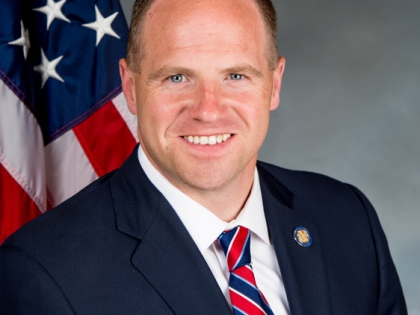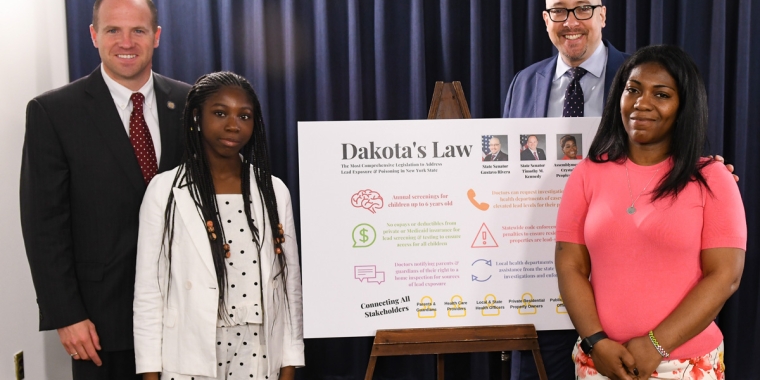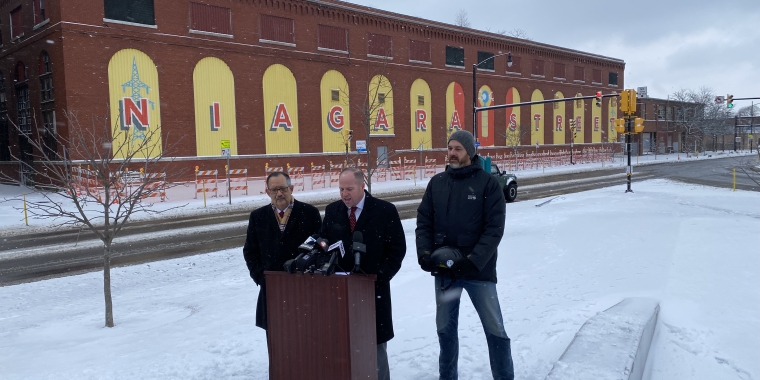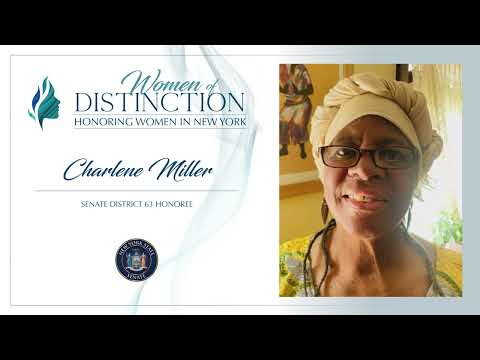
Kennedy, Rivera Announce Passage of Dakota's Law Through Senate's Health Committee
May 21, 2019
-
ISSUE:
- Lead Paint
- lead testing
- lead poisoning

(ALBANY, N.Y.) – Senator Tim Kennedy (D-Buffalo) joined Senator Gustavo Rivera (D- Bronx) Tuesday to announce that Dakota’s Law (S.499B/A.7687), a lead prevention and mitigation bill introduced last year, has passed the Senate Health Committee. The bill is sponsored by both Kennedy and Rivera, as well as Assembly Majority Leader Crystal Peoples-Stokes (D-Buffalo) in the State Assembly. The bill has been referred to the Senate Finance Committee.
Dakota’s Law will enhance protocols for parents, guardians, healthcare providers, state and local health officers, private property owners, and public housing officials to take proactive action to prevent lead poisoning in children. The amendments recognize the recently adopted measure of changing the blood lead levels of concern from 10 to 5 micrograms, as recommended by the Center for Disease Control (CDC), as well as:
● Implement strong code enforcement protocols and subsequent penalties for individuals and/or entities that fail to ensure their properties are lead-safe;
● Require annual screenings for children up to 6 years old by healthcare providers. This would identify elevated blood lead levels to trigger home inspections and prompt mitigation of the source of the exposure to eliminate it before a child’s blood lead levels can cause permanent health damage;
● Require that doctors notify parents or guardians that they have a right to a home inspection if a child is at risk of lead exposure;
● Provide full coverage of lead screening and testing to ensure access for all children in New York State. This would expand parameters so that private health insurance and Medicaid coverage include preventive services and prohibits any copays and annual deductibles on these services;
● Require local or state health departments to investigate cases of elevated lead levels when reported by physicians;
● Allow local health departments to request assistance from the state department of health if they do not have the capacity or resources to conduct investigations and enforcement.
Dakota’s Law originated from the experience of Tiesha Jones, the mother of Dakota, a child living in a NYCHA apartment who experienced increasing blood lead levels throughout her childhood. Ms. Jones took Dakota to the doctor and received appropriate testing at the required ages, 12- and 24-months-old. Upon changing doctors at age 4, she was offered a lead screening and within this time frame, Dakota’s blood lead levels elevated from 5 micrograms to 45. This left Dakota with permanent developmental challenges that affect her education. If this bill had been law at the time, Dakota would have received a required test at age 3 and steps would have been taken earlier to identify and address the lead exposure in her home before it became detrimental to her health.
"The newly amended Dakota's Law is the most comprehensive approach to solve a public health crisis that should have been addressed a long time ago in our State," said Senator Gustavo Rivera, Chairman of the Senate Health Committee. "This multi-layered effort, spearheaded by the tireless work of Tiesha Jones, will make a real difference in the lives of millions of children and parents in New York. We must do everything in our power to end lead poisoning in New York State and ensure our children live in safe and healthy environments."
"Lead exposure continues to be a very real problem across New York State, and our children are suffering long-term as a result," said Senator Tim Kennedy. "A 2017 Reuters investigation revealed that in four zip codes in the City of Buffalo, 40% of children who were tested between 2006 and 2014 had high lead levels, making it one of the most saturated lead-burdened communities in the country. That needs to change, and New York needs to do its part to change it. Through Dakota's law, we're taking steps to enact stronger protections for those potentially exposed to lead through rental properties, and requiring routine pediatric screenings by health care professionals to protect children from dangerous lead levels, particularly in their formative years when exposure can cause permanent developmental damage."
“Establishing an evaluation and remediation process for elevated levels of lead in children’s bloodstreams is a concrete avenue toward environmental justice. Far too many children have been poisoned in my community and all over the state. It is vital that our most vulnerable children are protected from potential developmental delays, which can follow them their whole lives. Dakota’s law will help all children and families through a collaborative response to elevated lead levels,” said Assembly Majority Leader Crystal Peoples-Stokes.
"Dakota's Law will ensure New York children and their parents do not suffer from the devastating effects of lead poisoning," said Tiesha Jones, Dakota’s Mother and President of the NYCHA Bailey Houses Residents’ Council. "I don’t want child in our State to go through what Dakota did and this law will prevent precisely that by empowering parents with the tools they need and requiring all relevant stakeholders to take proactive action to protect children before it’s too late.”
"New York State has the highest number of children with lead poisoning in the country," said Kathleen Curtis, Executive Director of Clean and Healthy New York. "Addressing lead is critical in protecting our children. CHNY has played a major role in advocating for this, and will continue to do so until lead is no longer a threat to New York’s children."
Unfortunately, Dakota’s story is not an isolated incident. Data shows that where children experience poverty and where residential building stock is aging and neglected incidences of elevated blood lead levels rise. The Buffalo region has particularly high rates of elevated blood lead levels where four zip codes in particular have rates of 40% or more. From upstate to downstate New York, children are only receiving required screenings at 12- and 24-months-old at a statewide rate of 62.8%. By extending screening requirements to children older than 2 and through 6 years of age, the goal is to dramatically increase awareness and thus screening of children to identify more who have dangerous levels. By determining the areas where children may be exposed and undiagnosed and by creating statewide code enforcement standards for lead exposure remediation, Dakota’s Law is the most comprehensive legislation to proactively eliminate lead exposure and poisoning in children.
Share this Article or Press Release
Newsroom
Go to NewsroomSenator Kennedy 2023 Veteran Hall of Fame
November 10, 2023



Senator Kennedy 2022 Woman of Distinction
August 26, 2022
